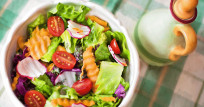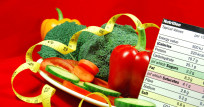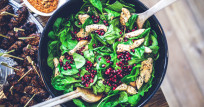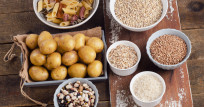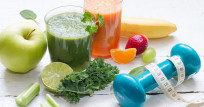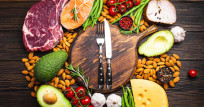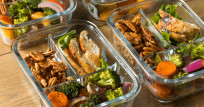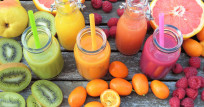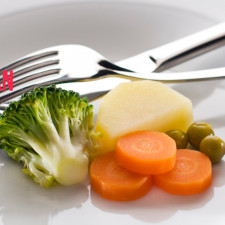Do vegetarians eat enough proteins?
If you’re vegetarian and have been trying to incorporate good veggie protein sources into your diet, you probably have a long list of annoying questions you’re tired of hearing, such as “How can you possibly live without bacon?” — or “Are you sure you’re getting enough protein?” Possibly followed by “How do you get protein as a vegetarian?”
These are not stupid questions since protein is essential for a healthy lifestyle. Your body uses protein to help it make hormones, build and repair muscles, and much more.
And yes, meat is a good source of protein. Just ask any bodybuilder who practically lives on lean chicken and fish (yeah!! 💪🏻💪🏻). But there are also plenty of vegetarian protein sources and vegan protein sources that can help you hit your “macros”.
The Benefits of Plant-Based Protein
There are many good reasons to consider becoming a vegetarian (no, thank you), or at least adding a few meatless days to your weekly meal plan (part-time vegetarian anybody?).
Most vegetarian protein sources are much lower in calories, and saturated fat than meat protein and many vegetarian proteins are whole grains with fiber and vital nutrients. Sooooo it’s totally possible to get all the nutrients you need without eating meat. You can decide for yourself. I’m a carnivore/part-time vegetarian.
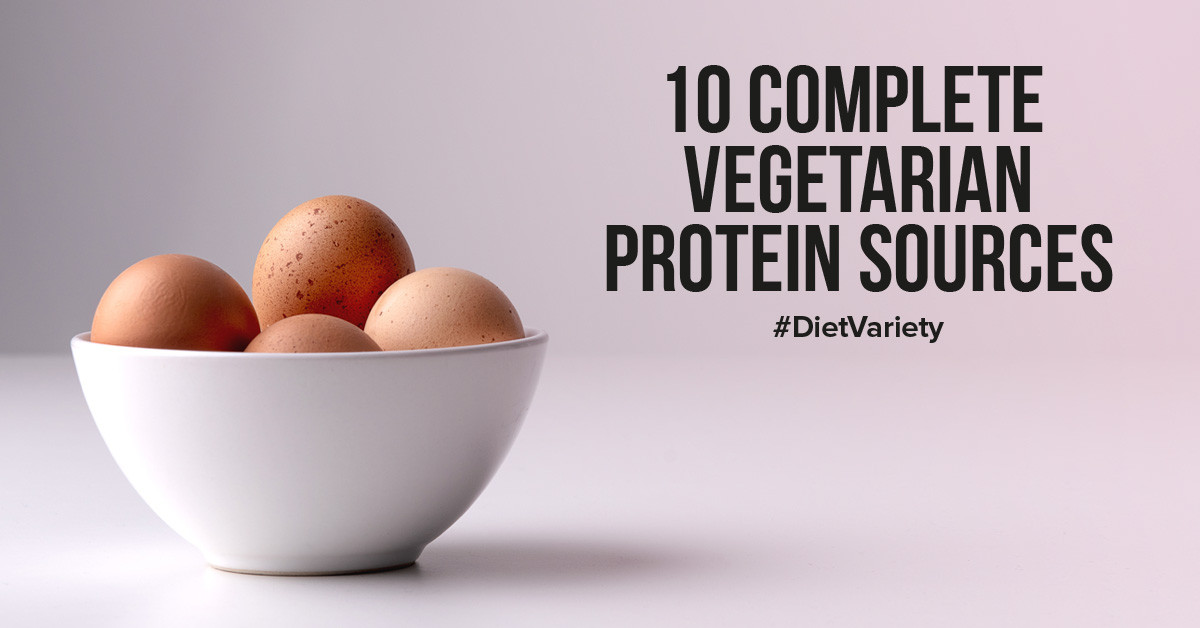
What is a complete protein?
I don’t feel complete without tasty streaky bacon or a schnitzel! 🥓🍔🍖🍗 Forever. A common concern is that vegetarian protein sources don’t stack up against meat because they’re not “complete” proteins. But…what exactly is a “complete” protein?
Quick science lesson in complete protein: Amino acids are the building blocks of protein, and your body needs 20 different types of amino acids to function at its best. Your body can synthesize 11 of them, but the remaining nine, known as essential amino acids, have to come from your diet.
If a protein source contains certain levels of all nine essential amino acids (Tryptophan, threonine, isoleucine, leucine, lysine, methionine, phenylalanine, valine, and histidine), it’s considered a complete protein (Yep, I googled that one 🧠 !)
As your meat-loving friends have probably bragged, meat is a complete protein. And yes, being a vegetarian makes things a bit trickier, but meat isn’t the only complete protein source out there (did your mind just exploded or what?🤯)
10 Complete Vegetarian Protein Sources
These vegetarian protein sources contain an acceptable amount of all nine essential amino acids, so adding them to your meal plan makes it easy to get a complete protein at every meal. Lacto-Ovo vegetarians can take advantage of all of them; Vegans – go climb a tree!
Protein in eggs 🥚 🥚
Eggs — like all animal products — are a complete protein source. A large egg has only 70 calories, contains 6g of protein, and is full of vitamins like B12, selenium, and choline. How do you like them? Me, I prefer them poached 🤷🏻♀️ Eggs are relatively high in dietary cholesterol, but recent research has found the cholesterol in eggs shouldn’t have a significant effect on your blood cholesterol levels. Win-win. But check in again in 2 years when experts will disagree on that statement 🧐🤓.
Protein in yogurt & cottage cheese
Dairy products are complete proteins because, again, they come from animals (duuuuuh!) And in the dairy department, low-fat yogurt and cottage cheese typically pack the most protein without making a huge dent in your calorie budget. One cup of low-fat cottage cheese contains 22 grams of protein and 180 calories, and 2% Greek yogurt contains 20 grams of protein and 150 calories per serving. Anything else you add – it changes the calories content – obviously!
Protein in Tofu, Tempeh, and Quorn
If you’re a vegetarian who kind of misses the taste of meat, you may already be well-acquainted with stand-ins like veggie bacon, chicken, and tempeh burgers. The good news is, these meat subs are also complete sources of protein. The key players are: Tofu and tempeh.
The firmer these soy-based substitutes are, the more protein they usually contain. A half-cup of firm tofu has 11 grams of protein per half-cup; tempeh, another plant-based protein, has more than 16 grams of protein per half-cup.
Protein in Quorn.
The main ingredient in this meat substitute is mycoprotein, also known as fungal protein (yep, you read it correctly). It can be molded and seasoned to create meatless chicken cutlets, bacon slices, sausage patties, and more. Depending on how it’s prepared, a serving of Quorn can contain ten or more grams of vegetarian protein. Just be mindful of the sodium, since salt is often added for flavor.
On a side note... Why do vegetarians want their food to be shaped as meat products? I’ve never encountered a carnivore that wants his burger or bacon to be shaped (and taste) like a carrot or cabbage… What’s up with that 🤔🤭
Protein in Quinoa, Buckwheat, Amaranth, and Teff
These are known as “pseudocereals” because they’re not technically members of the grass family, but their taste and texture are similar to grains. Quinoa gets hyped as a vegetarian protein source, and a cup of cooked quinoa contains a respectable eight grams of complete protein.
But buckwheat is the mysterious hero here. It actually has more protein than quinoa — 11 grams per half-cup of buckwheat — and higher quantities of the essential amino acids (and its easier to pronounce!). Suck on that, Quinoa!
How do you make a complete protein source?
If you don’t see your favorite vegetarian protein source on the list above (hello, beans?!), have no fear. For starters, even if a plant-based protein is incomplete, it’s still worth eating — incomplete protein sources like legumes, nuts, and veggies are super-healthy foods loaded with essential nutrients.
And your body doesn’t care if the amino acids all arrive together. What matters is that your body gets the amino acids it needs. As long as you have some variety in your diet — i.e., you’re not subsisting solely on bananas 🍌 (too many bananas will turn you into a 🐒) — you’ll most likely get all amino acids you need without even trying.
But if you’re determined to consume complete proteins at every meal, here are a few protein pairings that should do the trick:
-
Beans and rice. A cup of cooked black beans has 15 grams of protein. But they come up a bit short in the amino acids. Pair them with grains — another incomplete protein source — and they make up for each other’s shortcomings. True love!
-
Hummus and whole-wheat pita. Do I need to say more? Yum and yum! Double yum!
-
Soba noodles with peanut sauce. Just replace the chicken and chicken broth with tofu and veggie broth to create a vegetarian-friendly meal that combines several protein sources. The tofu and edamame could hold its own as a complete protein, of course, but you’ll also get extra protein from the soba noodles, peanuts & spinach (ask me for the recipe)
-
Oatmeal with almonds. Oats and almonds (and nuts in general) are this close to being complete proteins — they contain all the essential amino acids but fall a little short in tryptophan and methionine. But they’re still excellent protein sources — almonds contain 6 grams of protein per ounce, and oats contain 13 grams of protein per half-cup — woohoo!
-
Peanut butter on sprouted grain bread. It is another twist on the legumes and grains combo. Spread peanut butter (technically a legume, not a nut!) on a slice of sprouted grain bread for a quick pre-workout snack!
What I am trying to say is that you can still get plenty of protein and all the essential amino acids you need while enjoying a meat-free lifestyle. The key is making sure you get some variety in your diet — but with so many tasty sources of vegetarian protein available, that’s easier than it sounds. And if you want to stick to meat as your protein source – good for you! Peace out!
P.S. Whatever you do, remember - you can’t out-train a bad diet!
-
Liz de WitMindset coaching€ 0,42 pm
-
Jose W.Digital marketing€ 2,50 pm
